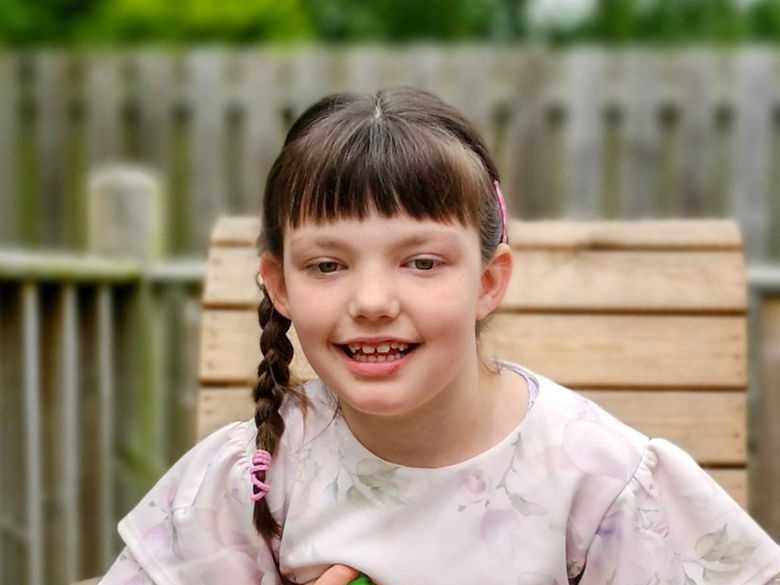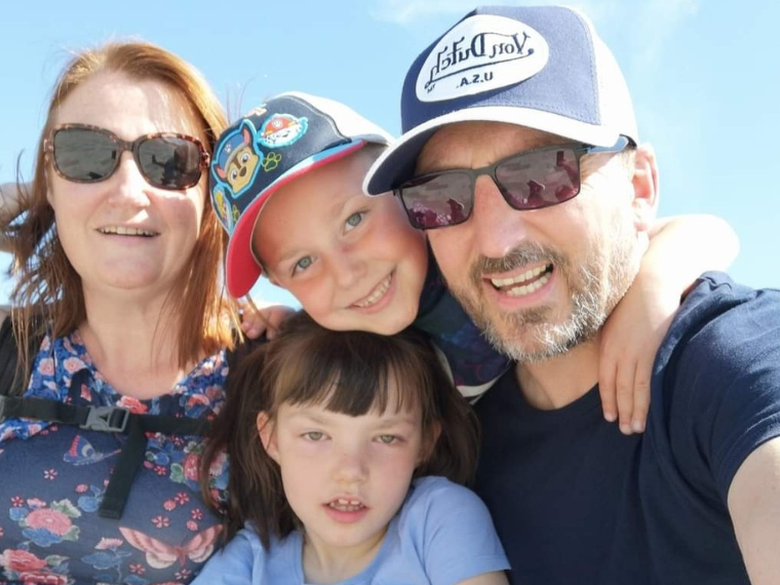5 images
Hannah
Hannah lives with parents Mark and Fiona and brother Reuben in Falkirk. She had her first seizure at 5 months old and was diagnosed with Dravet Syndrome aged 3 years old. Mark and Fiona share their story.
Hannah, our first child, was born premature at 34 weeks. She had her first seizure at 5 months old. At the hospital, medication couldn’t control the seizure and Hannah was sedated and ventilated.
This pattern repeated and each time Hannah had a seizure she was admitted to hospital. Rescue medications didn’t control the seizures. We were advised that she was having febrile convulsions and she was diagnosed with generalised epilepsy.
From then on, the first 3 years and 2 months of her life were a blur. There were a total of 6 times where Hannah needed to be sedated and ventilated and at these times she was transferred to Glasgow Children’s Hospital. The journey there would be terrifying. Only one of us could go with Hannah in the ambulance, while the other would drive the journey from Falkirk to Glasgow alone.
Watching Hannah having seizures is hugely difficult. We felt completely helpless as parents.
Gaining a diagnosis
Most of Hannah’s early years were spent in and out of hospital. Dravet Syndrome was first mentioned when Hannah was around 18 months old by her consultant at the Forth Valley Royal Hospital. We did our research and I think we knew deep down that Hannah did have this condition.
Hannah had more investigations at Glasgow Children’s Hospital under the supervision of Professor Zuberi which included an MRI scan and genetic testing. Hannah was 3 when the mutation of the SCN1A gene was confirmed and we had the diagnosis of Dravet Syndrome.

Mark had had several seizures in his 30’s and initially he took it upon himself, feeling that Hannah had inherited the seizures from him. It was a really stressful and traumatic time for him, however Professor Zuberi put us both forward for genetic testing and as our tests came back negative, we were reassured that this wasn’t the case. We were also able to get our younger son, Reuben, tested and again, found that he didn’t have the SCN1A gene mutation.
Facing challenges
Hannah is now at primary school and has been fortunate to have had the same teacher throughout. The number of children in each class is small with 5-6 children supported by a teacher and at least 2 Support for Learning Assistants, sometimes 3. We have built good relationships with the school and staff over time.
One of the main challenges we’ve faced is in balancing working and caring for the children. Family members helped care for Hannah and Reuben whilst we worked during their early years, however it was really difficult for them seeing Hannah have seizures, especially when they became prolonged and the rescue meds didn’t have any or very little effect. As a result, we had to change the care arrangements and Mark and I cared for the children between us.
We have limited opportunities to go out altogether as a family due to our working patterns. Things that other families may take for granted are not easy, for example at soft play I need to be close to Hannah or on the equipment with her at all times so that I can monitor her. I can’t let her go off on her own like other children do, as I need to be right with her to make sure she, and others around her, are safe.
We were gifted a seizure monitor from DSUK several years ago and we also have video and movement monitors. We still watch the monitor during the night and we also sleep in beside Hannah if she’s unwell or we suspect she is becoming unwell, as she’s more likely to have seizures in her sleep.
A turning point
Throughout her life, Hannah’s seizures have been extremely difficult to control and so it was agreed, when Hannah was 4 years old, that she fit the criteria for the Fenfluramine trial. As part of this process, numerous tests were carried out, including a heart ultrasound and echo. This is when we found out that Hannah had a hole in her heart and because of this, she wasn’t permitted to take part in the trial at that point.
Hannah bravely went through successful keyhole heart surgery at age 4. Since then, she has been able to access Fenfluramine on compassionate grounds.
What a huge difference this has made to Hannah’s and our lives! Previously Hannah could have anything between 15 and 20 short tonic clonic seizures during the night, but now, she only has occasional seizures. Incredibly, Hannah had 6 months seizure free last year.
We’ve gone from being constantly on edge, pulling over on the hard shoulder of motorways while Hannah had a seizure, delaying or cancelling holidays depending on how she has been feeling, putting her into the recovery position on the floor at the shops with many eyes on us when she’s suddenly had a seizure, to feeling more confident, less fearful and usually able to spot the triggers in advance. Hannah’s quality of life has improved as she also benefits from our reduced stress levels and can take part in more activities.
We are so thankful Hannah isn’t currently having these traumatic seizures but equally we know that Dravet Syndrome is unpredictable and so we’re realistic and enjoy the time we’ve got. We’re conscious that it may not always be this way.
A remarkable wee girl who loves life
Over the years Hannah has been one strong girlie. She brightens up any room and loves interacting with adults especially, but is getting better with her peers. Hannah also seems to have a natural instinct for knowing when someone needs a cuddle. She enjoys a laugh and is able to understand more than she can tell us.
As Reuben, Hannah’s brother, has grown older, he has accepted Hannah’s difficulties and appreciates what she brings to our family. He appears much more understanding and is great at engaging with Hannah in his own way. It’s been difficult for us as a family to give Reuben the same time and attention that Hannah has received and required and hard for him to understand what was happening to Hannah. If Hannah is frustrated, her behaviour can be challenging towards Reuben as she doesn’t have the language to tell Reuben what she wants. Despite this, Reuben loves his sister very much.
Hannah loves basketball, being outside, going for walks with her Grandad, his dog Smudge and now our dog, Timmy. She’d throw the ball and feed Timmy treats all day if she was allowed! She loves books, puzzles, choosing songs from YouTube, Peppa Pig, Hey Duggee and Tipping Point. As a keen football fan, she gets excited jumping up and down in front of the TV, watching with Daddy. She has kept us and nursery staff on our toes as she loves water and would do anything to get to it – she still loves water and sensory play.
We feel so blessed to have her. We love our wee girl just the way she is and for all that she brings to our family. Hannah has taught us so much about life, has taught us to accept that we can't always be in control and to take each day as it comes. Of course, we never want Hannah to have seizures and we would do anything for Dravet Syndrome to be taken away, be we love her enthusiasm for life and she is an absolutely amazing girl despite her difficulties.

